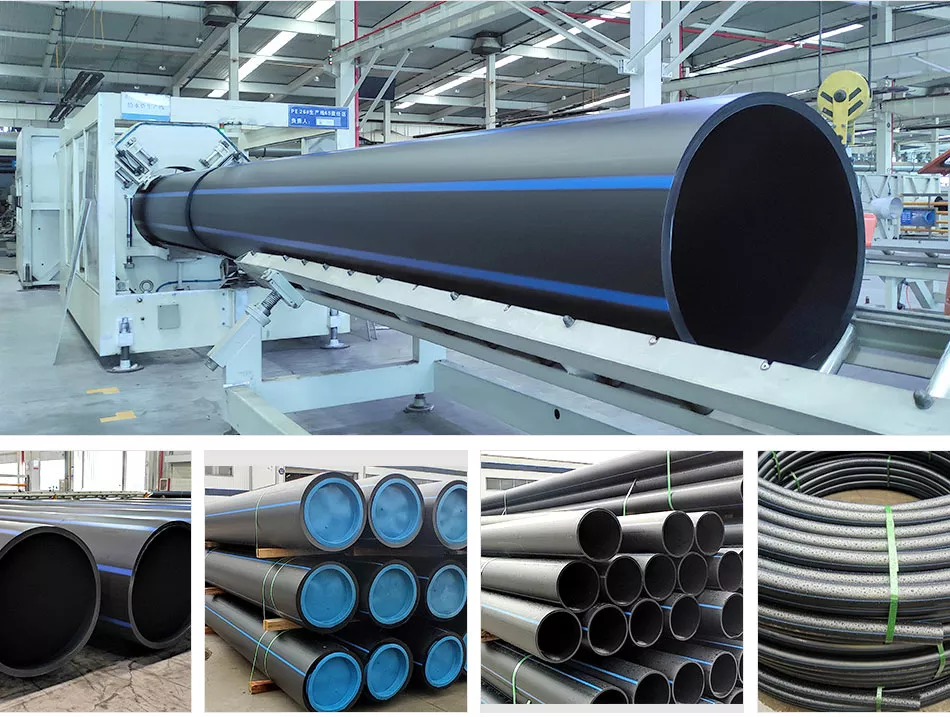Understanding the Key Benefits of HDPE Pipe for Water and Wastewater Management
Using HDPE pipe in water and wastewater management provides many advantages that merit consideration. Its remarkable durability and long life expectancy make it a recommended choice for several jobs. Furthermore, the material's resistance to rust and chemical damages boosts its reliability in various atmospheres. However, the benefits extend beyond just durability and resistance. Discovering its cost-effectiveness and environmental influence exposes even extra engaging reasons for its prevalent fostering in modern facilities
Phenomenal Sturdiness and Longevity

HDPE pipe attracts attention for its extraordinary durability and longevity, making it a favored option in water management systems. Built from high-density polyethylene, these pipelines can endure substantial pressure and anxiety, ensuring trustworthy efficiency in time. Their robust nature permits them to withstand extreme ecological problems, including temperature level changes and soil movements, which can cause other products to stop working.
The life expectancy of HDPE pipes frequently goes beyond half a century, providing a cost-effective service for municipalities and sectors alike. Additionally, the material's light-weight residential properties streamline installment, minimizing labor expenses and durations. This longevity minimizes the demand for frequent repairs or replacements, further boosting its financial charm.
In water administration applications, the reliability of HDPE pipelines suggests less interruptions and improved service continuity, making them essential to sustainable facilities growth. The mix of resilience and durability solidifies HDPE's role as a keystone in reliable water administration services.

Resistance to Deterioration and Chemical Damages
While lots of materials catch corrosion and chemical damage with time, HDPE pipes exhibit amazing resistance, making them optimal for various water monitoring applications. This durability comes from the molecular structure of high-density polyethylene, which is naturally non-reactive and does not rust like steels or break down from direct exposure to extreme chemicals. Consequently, HDPE is very efficient in atmospheres with aggressive materials, such as wastewater systems that might include acids, bases, and organic solvents.
In addition, HDPE pipes can withstand environmental factors such as soil acidity and saline problems, additionally enhancing their viability for varied applications (hdpe pipe suppliers Midland TX). Their ability to maintain architectural stability in time decreases the risk of leaks and failures, which is crucial in guaranteeing the safety and security and dependability of water circulation and wastewater administration systems. The resistance to deterioration and chemical damage significantly adds to the overall efficiency and longevity of HDPE piping remedies.
Cost-Effectiveness and Economic Benefits
When considering the financial implications of water management systems, the cost-effectiveness of HDPE pipelines ends up being noticeable. These pipes offer reduced setup and maintenance prices compared to conventional products like metal or concrete. Their lightweight nature streamlines transportation and installment, leading to reduced labor expenditures. In addition, HDPE pipes show a lengthy lifespan, often exceeding 50 years, which converts to less substitutes and lasting financial savings.
The resistance of HDPE to deterioration and chemical damages lessens the requirement for costly repair services and substitutes. The pipes additionally support efficient water flow, lowering energy prices linked with pumping systems. By alleviating leaks and water loss, HDPE pipelines add to significant financial benefits for communities and sectors alike. In general, the preliminary financial investment in HDPE piping can yield considerable economic returns over the lifespan of the water administration system, making it a sensible selection for sustainable facilities development.
Ecological Sustainability and Reduced Influence

Versatility and Adaptability in Installation
Due to their distinct residential properties, HDPE pipelines use exceptional convenience and adaptability in setup, making them appropriate for a variety of applications. Their light-weight nature enables much easier handling and transport, reducing labor expenses and installation time. HDPE pipelines can be bent and formed to fit various terrains and task needs, which is especially advantageous in testing atmospheres.
Furthermore, their resistance to deterioration and chemical damage permits for installation in varied setups without the requirement for specialized protective layers. The ability to fuse joints produces a continual, leak-free system, enhancing the total stability and integrity of the setup. HDPE's adaptability also suits ground motion, reducing the danger of damage in locations prone to moving soil. On the whole, these attributes make HDPE pipes not just versatile however likewise a preferred selection for water and wastewater administration systems.
Frequently Asked Questions
Exactly How Does HDPE Pipe Contrast to PVC in Water Monitoring Applications?
HDPE pipeline provides remarkable flexibility, resistance to corrosion, and longevity contrasted to PVC. Its lighter weight assists in much easier setup, while its lengthy life expectancy decreases substitute expenses, making HDPE a preferred selection in water management applications.
What Is the Life Expectancy of HDPE Water Lines Under Regular Problems?
Under regular problems, HDPE pipelines can have a life-span varying from 50 to 100 years. Their resilience and resistance to rust contribute to their long-lasting performance in different applications, making them a reliable choice for facilities.
Are HDPE Water Lines Recyclable After Their Life Span?
Yes, HDPE pipes are recyclable after their life span. Pipe Manufacturing Midland TX. They can be processed and repurposed right into brand-new items, significantly minimizing ecological sewage line clean out effect and advertising sustainability within the sector, making them an eco-friendly selection for piping solutions
What Is the Setup Refine for HDPE Water Lines?
The installment process for HDPE pipelines involves site prep work, trenching, pipe blend or mechanical signing up with, backfilling, and pressure screening. Appropriate methods guarantee a durable and reliable system for transporting water and wastewater effectively.
Can HDPE Pipes Be Used for Both Potable and Non-Potable Water Equipments?
Yes, HDPE pipelines can be used for both safe and clean and non-potable water supply. Their adaptability, continue reading this sturdiness, and resistance to corrosion make them suitable for numerous applications, making sure safe and reliable transportation of water in different contexts.